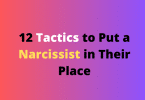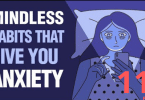Are you dealing with someone who is pessimistic, critical, demanding, stubborn, jealous, insecure, irritable, constantly dissatisfied, and emotionally volatile? If so, this person may have borderline personality disorder, specifically the petulant type.
Today I am talking about 10 ways to spot the petulant borderline. But keep in mind that the subtypes of borderline personality disorder can and do overlap, and the severity of the disorder can vary from mild to very severe. So, in addition to the diagnostic criteria for BPD or borderline personality disorder, here are 10 signs to help you spot the petulant type of borderline personality disorder.
Number one is their black cloud attitude.
Generally speaking, those with borderline personality disorder have an all-or-nothing, black-and-white thinking. But the petulant borderline has a very dark, all-black, very pessimistic worldview. They’re cynical and they struggle with always thinking in terms of worst-case scenarios. So, they worry a lot and they overreact to bad things that haven’t even happened, but that they imagine might happen. So, even happy times are clouded by their inability to see people and things through a positive lens. And no matter how much you try to help them see the bright side of things, they quickly turn their attention back to whatever’s going wrong or whatever problem they may be perceiving.
For the petulant borderline, they’re not doing this with any ill intention. They really do feel demoralized and overwhelmed with dark, anxious, fearful thoughts. There is no silver lining, and the more you try to point out the positives, the more negative and frustrated they get at your inability to see the world in a more realistic way.
Number two is a negative emotional state.
So, as you can imagine, with this negative mindset, the petulant borderline experiences a lot of negative emotions and mood swings as well. So, from rage to fear to guilt to shame, this can happen in the blink of an eye, and often you won’t see it coming. Unlike other types of borderlines that also feel and express intense positive emotions along with the negative, the petulant borderline’s emotional range is generally very negative.
It’s not to say that they never experience or show joy and happiness, but when they do, it’s usually short-lived and in response to something more extreme, like getting a promotion, buying a new house, or having a baby. Even at that, they will quickly start thinking about what might go wrong. So, their negative mental and emotional state can make it very difficult to have healthy relationships because most people just can’t handle this constant negativity.
Number three is anger.
The petulant borderline experiences explosive anger and lashes out at others. But often, they show their anger by being stubborn, irritable, annoyed, impatient, and through passive-aggressive behaviors. Meaning, they express their anger in indirect ways. So, they may say that everything’s fine but then pout, sabotage, guilt-trip, or give you long, drawn-out silent treatments. Sometimes, they just seem angry without any rational cause. And this makes them prone to not only attacking others but also attacking themselves through a variety of self-harming behaviors.
Number four is that they are very conflict-oriented.
The petulant borderline can be hostile, defiant, rebellious, antagonistic, insulting, and verbally aggressive, which is obviously off-putting to others. The petulant borderline often finds conflict even in the smallest things, sometimes seeming like they’re going out of their way to create it. So, you might say something like, “It’s a beautiful day,” and then they call you superficial or having no capacity for deep conversation.
Or maybe you ask how they’re feeling, and they accuse you of not caring, saying things like, “If you really cared about me, you’d…” So, they tend to create conflict and then feel victimized or even bullied when people fight back or when people start avoiding or excluding them. They want connection just like everyone else, but they have such a deep fear of rejection or being hurt that they put up a strong barrier that no one can get through. And anyone who tries is usually taken down by a sophisticated arsenal of defense mechanisms.
Number five is that they are highly resentful.
The petulant borderline is easily offended, highly defensive, and very, very resentful. They take things personally, which causes them to hold grudges that they just can’t seem to let go of. They mull it over and replay it in their mind. And no matter how much the person may apologize or try to redeem themselves, the petulant borderline does not forgive or forget.
Even if it was an innocent mistake or an accident. And they might say that they forgive you, but the issue will come up again and again. And they may also use it to justify their own bad behavior towards you. So, once you’ve been knocked off their pedestal and are out of their good books, there is virtually no way of getting back in.
Number six is a victim mentality.
And although the petulant borderline may have been victimized, they stay very focused and overwhelmed by their own emotional wounds and traumas. So, it’s like they’re unaware that other people may also be suffering. And they can be very self-centered, having a lot of difficulty seeing other people’s perspectives.
They may also use their problems or their past trauma as a justification for hurtful or abusive behaviors. They often get stuck in a “poor me” mindset. And this isn’t a conscious or deliberative manipulative tactic. They very much believe that they have no control over the way they are as a result of the trauma they’ve experienced.
So, the petulant borderline is the least likely to be self-aware or to take responsibility for their own healing and growth because opening those traumatic wounds and examining the emotions and beliefs that are driving them subconsciously is just too excruciatingly painful and scary for them.
Number seven is unreasonable expectations.
So, the petulant borderline is very perfectionistic and they hold other people to very high standards. And they have difficulty managing their disappointments when people let them down. And they have such unrealistic expectations of the people around them that it seems that no matter what you do, you are going to let them down. It’s not going to be good enough.
They are very, very demanding and very difficult to satisfy. So, the petulant borderline may expect you to meet their every need and know exactly what they need without telling you. But it’s actually impossible to meet their needs because no matter what effort you put in, it just doesn’t seem to lead to their satisfaction. And they end up feeling extreme disappointment and seeing you as having failed them. And seeing it as proof that you don’t love or care about them, which can often lead to threats and ultimatums.
From their perspective, they are experiencing deep emotional pain. And when you fail to meet their expectations, that pain is projected onto you. And you are seen as the cause of their suffering, which makes them want to avoid, escape, or hurt you. They may leave you rather than risk being let down or abandoned by you, or they may be so demanding of you that it causes you to leave them. But either way, they are subconsciously controlling and setting people up to fail them.
Number eight is jealousy and envy.
Others, are constantly comparing themselves to others internally, and they need others to see and validate their worth. They often talk poorly of everyone and believe that everyone’s happiness is fake, their success is due to cheating, lying, and so on.
And if you share the good news with them, they may say, “Oh, that’s really nice,” but then they turn the conversation back to themselves, often onto their problems, their physical ailments, or just how horrible the world is.
Alternatively, they may turn the conversation to their own successes or achievements, often making you feel that whatever your good news was, it was pretty insignificant compared to their successes or their problems, which are overshadowing yours. So, your happiness basically makes them feel bad and unworthy, which is why it’s so hard for them to share in your success.
Number nine is that they are very distrustful.
People with petulant-type BPD are prone to feeling very distrustful about other people’s intentions. They often assume the worst of everyone and are suspicious that everyone is out to get them.
They have an intense fear of being taken advantage of, of being deceived, or just being judged. And this distrust of others results in the petulant borderline being exceptionally hyper-vigilant about the actions, moods, and what other people are saying and doing around them.
It causes them to over-analyze every word, action, or behavior, and even to over-analyze their own words and behaviors. Because they are judging others harshly, they often feel judged. And they often need reassurance from other people on whether what they said or did was okay or acceptable.
But even the person reassuring them will be viewed through a suspicious lens. Friends and family are viewed as potential enemies who are just waiting to betray them. For example, perhaps you had plans to meet up for coffee, but you wake up feeling sick, so you ask for a rain check. The petulant borderline won’t take you for your word. Instead, they’ll believe that you are making up excuses because you don’t like them. You don’t want to see them.
They may even think that you’re canceling your plans with them because you’d rather be with other people. Even if they want to trust someone, they can’t. And because of this, they often don’t open up or feel emotionally connected to anyone. They often keep secrets, which causes more distress. And all of this creates a lot of social anxiety, which can cause them to avoid social gatherings or even one-to-one social interactions, again leaving them feeling very isolated and very alone.
Number 10 is guilt and worthlessness.
The petulant borderline is highly emotionally reactive toward others. Anger, fear, and guilt can cause them to lash out with extreme emotions. However, as opposed to, let’s say, a covert narcissist, the petulant borderline actually feels a lot of guilt and remorse following an emotional outburst. Their anger then turns inwards and they feel deeply shameful.
They will experience feelings of guilt, worthlessness, depression, self-hatred, and a lot of self-criticism. And for some, this can lead to dangerous behaviors such as self-harming or suicidal actions. The shame causes them to become very withdrawn or, on the opposite end, very needy of your love and attention to help relieve this shame storm that’s causing such emotional distress.
These feelings of shame and worthlessness are one of the top triggers for suicide attempts in people with BPD. So, it’s very important to help them seek the help that they need, especially when you have concerns that they are acting out of character or might be unsafe.
The good news about borderline personality disorder is that intensive treatment can help you learn to manage your symptoms, as well as reduce the negative impact it’s having on your life and on your relationships.
So, regardless of whether there is a mental health issue or personality disorder involved, it is important to recognize and protect yourself from any type of relationship abuse, including psychological abuse. And if you are being abusive towards someone, now is the time to get help because abuse is not okay, no matter where it is stemming from







Leave a Comment